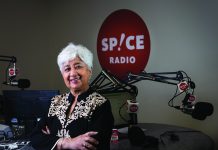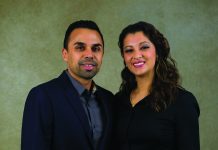
by Junita Thakorlal
72 Canadian women are diagnosed with breast cancer every single day. 14 of them will die according to the Canadian Cancer Society. Are you doing what it takes to ensure you aren’t a statistic?
Meet Jas Janda-Wiseman, a go-getter who has spent the last 35 years in the banking industry, moving up the ladder to Director of Western Canada at Scotiabank. She worked hard to build her career alongside marrying for love, having 4 children, and 2 grandchildren, and just kept putting off her mammogram due to her busy lifestyle.
In November 2015, she found a lump in her right breast. After several mammograms, scans, and biopsies, the news was confirmed on January 21, 2016 that she had cancer.

Q: Describe what you felt the moment you were diagnosed.
I was in disbelief and shock. I couldn’t hear anything the doctor said after the word “cancer”.
Q: Describe your treatment.
I had surgery in February 2016 and started 15 months of chemotherapy which was administered every 3 weeks. Chemo is supposed to destroy all of the cells in your body. It literally kills everything, good and bad. My cancer was rated 3 out of 3 for aggressiveness, I had to have chemo to ensure that all the cancer would be gone. Each cancer patient has their own special “cocktail” mix of chemo depending on the type of cancer they have, height, weight, etc. I had strong doses of chemo, especially the last 4 cycles where I would be in the room for 6 hours. I had another surgery in October 2016 to remove more lymph nodes, followed by radiation to ensure that any rogue cancer cells would be destroyed.
Q: Describe what toll the treatments had on your body.
The treatments were hard, there were so many side effects. Along with the 2nd degree radiation burns on the right side of my torso (front and back), which have healed now but has left scaring and discoloured skin, I also had nausea, allergic reactions, hair loss, major fatigue, mouth sores, pain throughout my joints and muscles, chills, insomnia, weight gain, weight loss, skin peeling off, neuropathy, inability to do even the smallest task, foggy brain, memory loss, sadness, loss of identity, loss of control, and fear for my children. Lots goes through the mind. I almost lost my house, all of my friends, my peace of mind, and even my sanity. I didn’t even have the energy to make dinner or drive myself to appointments so I’m grateful to those few friends who took care of the little things like that.
Q: What was the mindset you kept getting you through the toughest moments?
“This too shall pass” is what I kept telling myself. I knew I was meant to learn from this. I’m also grateful that I was able to emerge with a strong sense of peace and self, and I know who my true friends are.
Q: Describe your daily regimen today.
I am currently on maintenance medication (Latrozole) for 5 to 10 years which has its own side effects. I have weened myself off the blood pressure medication and the pain medication. I changed my diet to get rid of processed foods, I’ve increased my green veggies and lentils, take some plant based medications, I go for a 1-hour walk every day in the rain or shine, and I meditate each morning for a half hour. My evening ritual consists of dousing myself in lavender-scented castor oil to alleviate my muscle and joint pains.
Q: What advice do you have for other women?
Go for a mammogram! My appeal to all is to take care of you first. Eat healthier, exercise, reduce your stress! For those that have been recently diagnosed, look for alternate ways to heal your body naturally along with the traditional medicine. Remove all negativity from your surroundings – it’s okay to say “no” and it’s also okay to ask for help. It’s very important to have a network of women that have had to go through this experience, together we can help support each other.
























